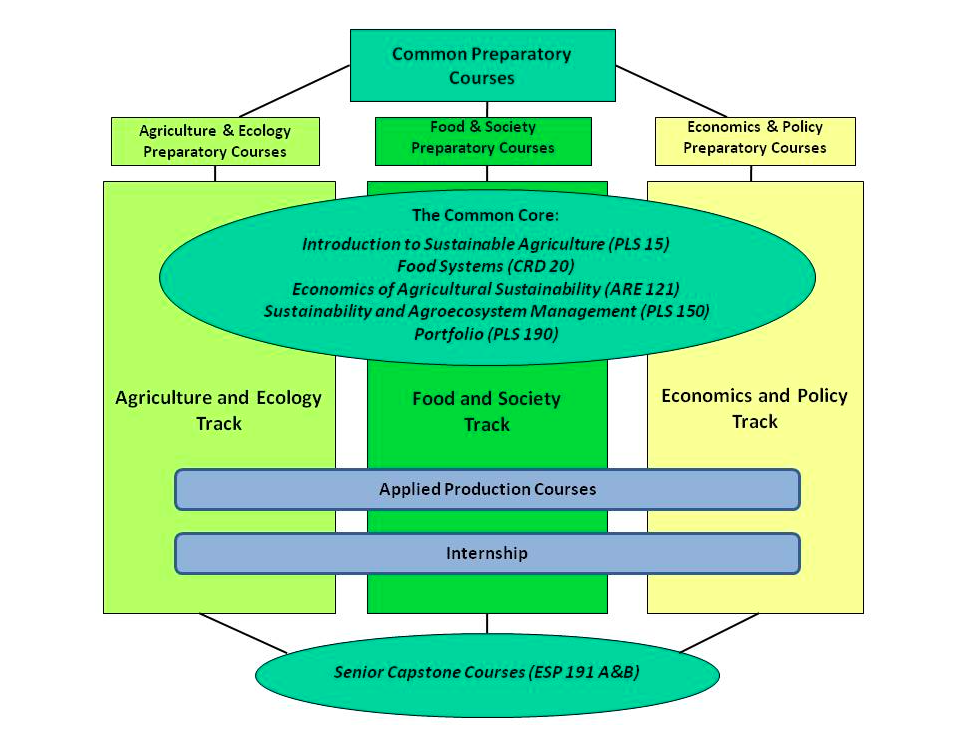Students majoring in Sustainable Agriculture and Food Systems focus on the social, economic, and environmental aspects of food from its starting point as an agricultural product to and beyond the consumer plate. The program is designed to help students obtain a diversity of knowledge and skills through personal, academic, and curricular experiences. The seven learning objectives listed below provide a framework for the SA&FS education and experience.
7 Learning Objectives
Systems Thinking: Students are competent in the analysis of complex systems, integrating societal, environmental and economic perspectives. Students reflect systems thinking in a deepening understanding of complexity, holistic approaches, and how the parts relate to the whole.
Experimentation and Inquiry: Students formulate questions, investigate current knowledge gaps, develop sound research design, learn current research methods and perspectives, experiment with new approaches to scientific inquiry, and integrate scientific and practical knowledge.
Interpersonal Communication: Students work in collaborative teams, present information for varied contexts and audiences, negotiate approaches and viewpoints and take leadership roles on important issues.
Understanding Values: Students reflect critically on their own values and examine different paradigms and perspectives, seeing beyond objective data to understand how values shape commerce, research, policy and action in sustainable agriculture and food systems.
Strategic Management: Students work to collectively design and implement interventions, anticipating future scenarios and adaptively managing information, human and natural resources for maximum impact.
Civic Engagement: Students work to make a difference in the civic life of their communities, through both political and non-political processes. As part of a larger social fabric, students consider social problems to be at least partly their own; make and justify informed judgments; and take action when appropriate.
Personal Development: Students seek deeper understanding of their own and thinking and learning processes. They can tolerate ambiguity, respecting those with differing opinions and beliefs, while setting firm standards for behavior and holding themselves and others accountable. Students work to promote open expression of individuality and diversity within the bounds of courtesy, sensitivity and respect.
______________________________________________________________________________________________________________
Guiding Principles
The major includes several innovative features designed to help students acquire the knowledge, skills, and understanding need to develop and work in more ecologically, economically and socially viable food and farming systems.
These include:
- Interdisciplinary Breadth: Integrating natural and social science knowledge and skills
- Systems Thinking: Understanding connections among diverse components of farming and food systems, social institutions, and the environment.
- Skill Development: Gaining practical skills including communication, analysis, problem solving, critical thinking, teamwork and leadership
- Experiential Learning: Engaging in wide range of practical experiences in agricultural and food systems through laboratories, field exercises, internships and other means.
- Linking the Real World with Classroom: Bringing practitioners into the classroom, sending students into the field, and discussing and analyzing these experiences.
- Community Building: Being part of community that includes students, faculty, internship sponsors, and others enhances learning and reflects the reality of life after school.
______________________________________________________________________________________________________________
Curriculum Design
The curriculum is built around six key categories, which allow students to develop a shared knowledge base and social network. They are: core courses, applied production courses, preparatory courses, a communication requirement, restricted electives, and an internship requirement.
The core courses were designed to incorporate all seven of the objectives and include:
- Introduction to Sustainable Agriculture (PLS 15)
- Food Systems (CRD 20)
- Sustainability and Agroecosystem Management (PLS 150)
- Sustainable Animal Agriculture (ANS 112)
- Economics of Agricultural Sustainability (ARE 121)
- Seminar in Alternative Agriculture (PLS 190)
- Capstone: Workshop on Food System Sustainability (ESP 191a, b)
The applied production courses emphasize development of practical skills that can be applied to a wide range of career opportunities in agriculture and food systems.
The preparatory classes in each track provide basic disciplinary training in agricultural, environmental, and social sciences. In upper division classes students can choose from several areas of specialization.
The communication requirement encourages students to craft their ability to speak effectively about topics in sustainable agriculture and the food system.
Restricted electives allow students to specialize in an area within sustainable agriculture and the food system.
Student internships will focus on off-campus experiences within diverse segments of agriculture and food systems. This may include working on farms or in food businesses, with government agencies or nonprofit organizations.
Applicable Skillset
Wondering about the real world application of these 7 Learning Objectives? Peruse the 7 Learning Objectives/Skillset PDF that highlight the possible skillsets that can come out of an academic study focusing on these learning objectives. The UC Davis Internship and Career Center (ICC) identifies five categories that skillsets fall into: Verbal Communication, Nonverbal Communication, Written Communication, Train, Analyze, and Research. See the Transferrable Skills Inventory Worksheet for more information!
Conceptual Model

